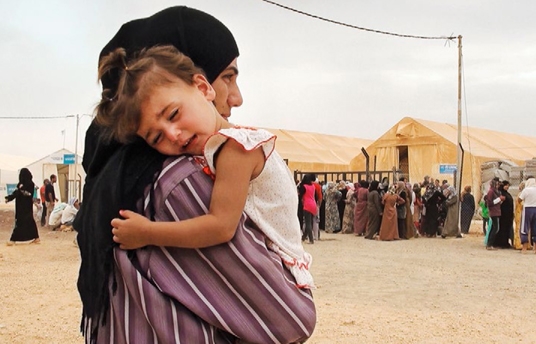From Berlin: Blog #3
Feb 13, 2013

Al Intithar | The Waiting | Das Warten
By Kaleem Aftab, Berlin International Film Festival 2013
“I was inspired to explore the idea of the house by Anthony Shadid, who wrote that in the Arabic culture, and the Muslim culture in general, home is the identity that never fades” says 50-year-old Italian director Mario Rizzi. “Feelings, interactions and simple everyday events in the house can also unravel the revolutionary events happening today in the Arabic society at large.”
His new short film “Al Intithar” (The Waiting) takes place in Camp Zaatari in Jordan, which hosts refugees displaced from Syria in the last months (the camp opened on July 28, 2012). “The protagonist is Ekhlas, a Syrian widow and her three children, while the co-protagonists are another refugee woman, who decides to leave the camp to come back to Syria, and the growing camp itself.”
“I’ve been following the situation for the last three years through Twitter, news and books and wanted to focus on the dreams of the Syrian people and on how they bring a new reality to their life. The camp was the logical choice to represent this.”
Best known as an artist, Rizzi has a long history of working in the Middle East. In 2005, he was awarded the Best Artist Prize at the Sharjah Biennial 7 for his video installation “Out of Place”. His short film “impermanent”, a portrait of a 96-year-old Palestinian doctor, a two-time refugee in 1948 and 1967, was selected for the Berlinale Shorts Competition in 2008.
In order to shoot “Al Intithar”, Rizzi went to live in the Jordanian camp for seven weeks, as he wanted to get very close to their life, a kind of insider so to say. “I wanted to choose one protagonist, whose psychological portrait would also reflect the ‘normality’ you need to create in such a harsh condition of life. Despair wouldn’t make you any good, when living in a refugee camp. Initially I didn’t think about a widow, but, when I met Ekhlas, I was very impressed by her determination and her capacity to keep the family reunited through the precariousness of the everyday.”
Rizzi also adds, “It was also important that she would be a woman, not only because 75-80% of the refugees in the camp are women and children. Women have a fundamental role in making life going on in the camp, notwithstanding the conservative Islamic background of the refugee families, mostly coming from the rural areas around Deraa and Homs. I am sure that if the camp has a rich life of relations, it’s the women who are making it possible, they negate or overcome every tension, they find a solution even when there is no money, no food and there are no clothes or warm blankets. Having a woman as the protagonist of my film is an essential statement.”
“Al Intithar” is the first film in the planned ‘BAYT’ trilogy, which reflects on the emergence of a new civic imagination in the MENASA region and focuses on how the narration of a revolutionary event can be closely entangled with the narration of simple everyday events in the lives of unknown people. The second part of the trilogy, “Platform”, has already been shot in Malaysia in 2012 and the third one, “Bayt”, will most likely be a medium length film to be shot in Tunisia, Egypt, Bahrain and Syria.